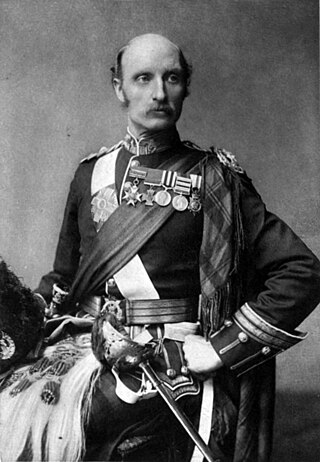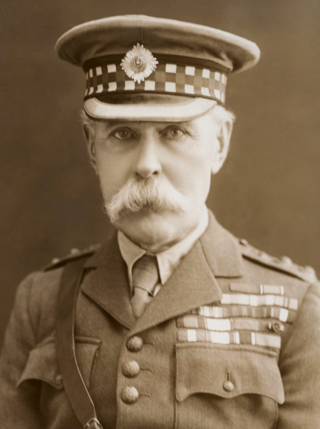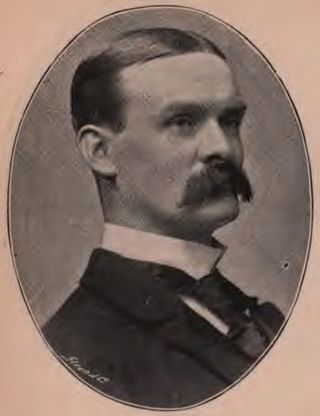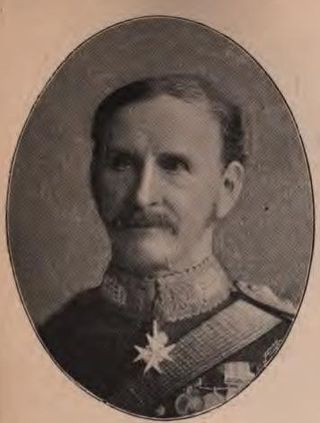Related Research Articles

Field Marshal Sir George Stuart White, was an officer of the British Army. He was stationed at Peshawar during the Indian Mutiny and then fought at the Battle of Charasiab in October 1879 and at the Battle of Kandahar in September 1880 during the Second Anglo-Afghan War. For his bravery during these two battles, he was awarded the Victoria Cross. He went on to command a brigade during the Third Anglo-Burmese War in 1886 and became commander of Quetta District in 1889 in which role he led operations in the Zhob Valley and in Balochistan. He was commander of the forces in Natal at the opening of the Second Boer War and fought at the Battle of Elandslaagte in October 1899. He commanded the garrison at the siege of Ladysmith: although instructed by General Sir Redvers Buller to surrender the garrison he responded "I hold Ladysmith for the Queen" and held out for another 75 days before being relieved in February 1900. He finished his career as Governor of Gibraltar and then as Governor of the Royal Hospital Chelsea.

Field Marshal Paul Sanford Methuen, 3rd Baron Methuen,, was a British Army officer. He served in the Third Anglo-Ashanti War in 1873 and then in the expedition of Sir Charles Warren to Bechuanaland in the mid-1880s. He took a prominent role as General Officer Commanding the 1st Division in the Second Boer War. He suffered a serious defeat at the Battle of Magersfontein, during which he failed to carry out adequate reconnaissance and accordingly his artillery bombarded the wrong place leading to the Highland Brigade taking heavy casualties. He was later captured by the Boers at Tweebosch. After the war, he became General Officer Commanding-in-Chief in South Africa in 1908, Governor and Commander-in-Chief of Natal in 1910 and then Governor and Commander-in-Chief of Malta in 1915.

Richard Knight Causton, 1st Baron Southwark PC, DL was an English stationer and Liberal politician who sat in the House of Commons in two periods between 1880 and 1910. In the same year he was raised to the peerage and sat in the House of Lords.

Field Marshal George Francis Milne, 1st Baron Milne, was a senior British Army officer who served as Chief of the Imperial General Staff (CIGS) from 1926 to 1933. He served in the Second Boer War and during the First World War he served briefly on the Western Front but spent most of the war commanding the British forces on the Macedonian front. As CIGS he generally promoted the mechanisation of British land forces although limited practical progress was made during his term in office.

William Snowdon Robson, Baron Robson, was an English lawyer, judge and Liberal politician who sat in the House of Commons twice between 1885 and 1910.

Sir John Scurrah Randles was a British businessman and Conservative politician. He was knighted in 1905 by King Edward VII, King of the United Kingdom (1841-1910).

Colonel Sir Charles Wyndham Murray, was a British Army officer and politician. He served as a Conservative Member of Parliament MP for Bath from 1892 to 1906 and as Gentleman Usher of the Scarlet Rod of the Order of the Bath from 1913 until his death.

Sir Robert Purvis was a British barrister and Liberal Unionist politician. He sat in the House of Commons from 1895 to 1905 as the Member of Parliament (MP) for Peterborough.
Francis Hunt Gould was an English first-class cricketer and British Army officer.
References
- ↑ "Knight Bachelor", Encyclopedia Britannica . Retrieved 5 April 2020.
- 1 2 The London Gazette , 14 February 1905 (issue 27764), p. 1113.
- 1 2 3 4 5 6 7 8 9 10 11 12 13 14 15 16 17 18 19 20 21 22 23 24 25 26 27 28 29 The London Gazette , 25 July 1905 (issue 27821), p. 5143.
- 1 2 The London Gazette , 25 July 1905 (issue 27821), p. 5144.
- 1 2 3 4 5 6 7 8 9 10 11 12 13 The London Gazette , 19 December 1905 (issue 27865), p. 9083.
- 1 2 3 4 5 6 7 8 9 10 11 12 13 14 15 16 17 18 19 20 21 22 23 The London Gazette , 19 December 1905 (issue 27865), p. 9084.
- ↑ The London Gazette, 10 November 1905 (issue 27853), p. 7499.
- ↑ The London Gazette , 17 November 1905 (issue 27855), Page 7706.